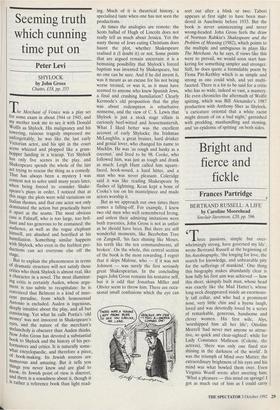Seeming truth which cunning time put on
Peter Levi
SHYLOCK by John Gross Chatto, £18, pp. 355 The Merchant of Venice was a play set for some exam in about 1944 or 1945, and my mother took me to see it with Donald Wolfit as Shylock. His malignancy and his towering, ruinous tragedy impressed me unforgettably; he was like the last early Victorian actor, and his spit in the court scene whizzed and plopped like a grass- hopper landing in a teacup. Yet Shylock has only five scenes in the play, and Shakespeare spends the whole of the last act trying to rescue the thing as a comedy. That has always been a mystery I was Content not to solve until many years later, when being forced to consider Shake- speare's plays in order, I noticed that at this stage the plots were wild variations on Italian themes, and that one actor not only dominated the action but practically burst it apart at the seams. The most obvious case is Falstaff, who is too large, too bril- liant and too generous to be contained: the audience, as well as the rogue elephant himself, are abashed and horrified at his humiliation. Something similar happens with Shylock, who even in the feeblest pro- ductions can act everyone else off the stage.
But to explain the phenomenon in terms of dramatic structure will not satisfy those critics who think Shylock is almost real, like a character in a novel. The most illuminat- ing critic is certainly Auden, whose argu- ment is too subtle to recapitulate: he is convinced that Belmont is a kind of inno- cent paradise, from which homosexual Antonio is excluded. Auden is ingenious, deeply intuitive about the play, and all but convincing. Yet what he calls Portia's 'old money' was not innocent in Shakespeare's eyes, and the nature of the merchant's melancholy is obscurer than Auden thinks. Now John Gross has devoted a substantial book to Shylock and the history of his per- formances and critics. It is naturally some- what encyclopaedic, and therefore a piece, of book-making. Its Jewish sources are numerous and amazing. But it tells you things you never knew and are glad to know, its Jewish point of view is discreet, and there is a soundness about it, though it is rather a reference book than light read-
ing. Much of it is theatrical history, a specialised taste when one has not seen the productions.
At times the analogies are remote: the Scots ballad of Hugh of Lincoln does not really tell us much about Jessica. Yet the nasty theme of Jews eating Christians does haunt the plot, whether Shakespeare realised it (I doubt it) or not. Some points that are argued remain uncertain: it is a bemusing possibility that Shylock's forced baptism was invented by Shakespeare, but no one can be sure. And if he did invent it, was it meant as an excuse for his not being worse treated, or was it, as it must have seemed to anyone who knew Spanish Jews, a final and crushing humiliation? Clearly Kermode's old proposition that the play was about redemption is rebarbative nonsense, and the view of C. S. Lewis that Shylock is just a stock stage villain is curiously beef-witted and housemasterish. What I liked better was the excellent account of early Shylocks: the Irishman McLaughlin, a great bruiser, hard drinker and genial lover, who changed his name to Macklin. He was 'as rough and husky as a coconut,' and lived to be 98. Cooke, who followed him, was just as tough and drank as much: Leigh Hunt called him square- faced, hook-nosed, a hard hitter, and a man who was never pleasant. Coleridge said it was like reading Shakespeare by flashes of lightning. Kean kept a bone of Cooke's toe on his mantelpiece and made actors worship it.
But as we approach our own times there comes a falling-off. For example, I knew two old men who well remembered Irving, and unless their admiring imitations were both travesties, John Gross is not as unfair as he should have been. But there are still wonderful moments, like Beerbohm Tree on Zangwill, 'his face shining like Moses, his teeth like the ten commandments, all broken'. On the whole, this central section of the book is the most rewarding. I regret that it skips Malone, who — if it was not Johnson — was surely the first seriously great Shakespearian. In the concluding pages John Gross remains his tentative self, but it is odd that Jonathan Miller and Olivier seem to throw him. There are occa- sional small confusions which the eye can
sort out after a blink or two: Tabori appears at first sight to have been mur- dered in Auschwitz before 1933. But the book is never uninteresting and never wrong-headed. John Gross feels the draw of Norman Rabkin's Shakespeare and the Problem of Meaning (1982), which points to the multiple and ambiguous in plays like The Merchant. As he says, if views like this were to prevail, we would soon start han- kering for something simpler and stronger. Still, he does quote a formidable poem by Fiona Pitt-Kethley which is as simple and strong as one could wish, and yet multi- faceted. There is a lot to be said for a critic who has so wide, indeed so vast, a mastery. He even chronicles the aftermath of Wolfit spitting, which was Bill Alexander's 1987 production with Anthony Sher as Shylock, `a caricature oriental that a white racist might dream of on a bad night,' garnished with prodding, manhandling and stoning, and 'an epidemic of spitting' on both sides.


















































 Previous page
Previous page